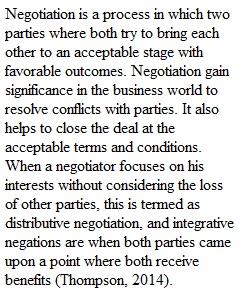


Q Post-Negotiation Reflection #2 Due: Tuesday, April 20 at 6:00PM Purpose: In the second portion of class we’ve completed more advanced negotiation role plays that highlight both the variety and complexity of different scenarios that you may face. In this reflection paper, you will write about what you’ve learned from these advanced negotiation roles, and/or what you’ve learned over the course of all the role negotiations completed since the beginning of the semester. Skills: • Analyzing and/or comparing the features of different negotiation roles • Illustrating why you obtained the outcomes you did in negotiation roles • Understanding and describing your own negotiation style and preferences Knowledge: • Recognizing and applying negotiation concepts and terminology • Writing skills Task: You have several options for your reflection assignment. 1. Select one of the six roles completed since Reflection #1 that you found especially interesting or surprising. See the list of role plays on page 3. Describe your perceptions and significant insights gained from your participation in the negotiation exercise. The paper should not be a detailed report of everything that happened in the negotiation. Rather, the paper should focus on analysis and insights. Here are a few examples of the types of question you might consider: • What happened in the negotiation (a brief overview of key events)? • What were the critical factors that affected how the negotiation progressed and your outcomes? What can you say about these factors in general? • What did you learn about negotiation or conflict from this situation? How do the concepts in the lectures and readings enrich your understanding of the process of this negotiation and its outcome? • What features of the negotiation made it more difficult or “advanced”? • What did you learn about yourself or others from this experience? 2. You could reflect on the patterns you saw among multiple roles from the current batch, or from roles earlier in the semester. For example, you may have noticed some patterns among the integrative agreements that you reached, or maybe you reached an impasse in more than one of the roles. Format: 3 to 5 pages, double spaced, 12-point type. Submit as a MS Word or pdf file to the assignment link on Canvas, by 6:00PM on Tuesday, April 20. Plan accordingly since you also have a negotiation planning document due this evening. It’s OK to select a reflection topic that allows you to submit early. Criteria for Success: A high quality analysis is one that tries to step back from a negotiation, identifies key events and processes, uses course concepts (from the readings, lectures, and discussions) to help structure the analysis, demonstrates personal growth, and is well written. Typically, people focus too much on narrative (i.e., what happened) and not enough on analysis (e.g., why it happened, what you learned, what concepts it illustrates). Rubric Criteria Definition Points Content reflection and class concepts Student accurately applies course concepts and terminology, giving analysis and evaluation Strong: 8-10 Moderate: 4-7 Weak: 0-3 Personal awareness and growth Student demonstrates personal awareness of role performance and responses to different kinds of negotiation situations. May identify strengths and challenges, may describe how others’ styles or the nature of the issues influenced them Strong: 8-10 Moderate: 4-7 Weak: 0-3 Professional writing quality Well-written with clear organization and adequate attention to writing mechanics (typos, grammar, formatting) Note that writing feedback is cumulative over the semester. If feedback is given on a particular aspect of your writing, I expect to see the item corrected in future assignments. If the same kinds of mistakes are included on later assignments, the deductions are bigger. Strong: 4-5 Moderate: 3 Weak: 0-2 Total 0-25 points Negotiation Reflection Worksheet (Part 2) Negotiation Your Role (style comments) Your Partner (style comments) Concepts Insights Pasta Wars Bullard Houses Zephyr Grand Strand Towers Market Virtual Victorian International Lodging Merger
View Related Questions